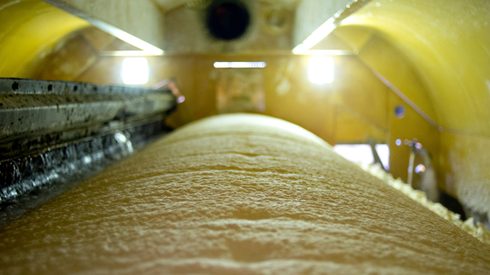There was no relief for pulp buyers in March as prices for both the benchmark grades once again posted substantial gains.
On top of a continuation of market dynamics that have been buoying prices since the start of the year, including low inventories, logistical issues and improving domestic demand, pulp sellers found additional support in March from new supply-side problems, notably the transport strikes in Finland that stretched throughout much of the month, forcing downtime at a number of Finnish pulp and paper producers and putting pulp deliveries at risk.
If the strikes were not enough, an explosion in the evaporation unit at Metsä Fibre’s 1.3 million tonne/yr pulp mill in Kemi, Finland, late in the month has taken the plant offline for an estimated 10-12 weeks while repairs are carried out.
Given the current situation, market contacts do not expect things to cool down, at least in the near term. Bleached eucalyptus kraft (BEK) pulp producers have already announced further price increases for this month, and multiple sources said price levels are likely to rise further before the summer season sets in.
NBSK up as market tightens
The northern bleached softwood kraft (NBSK) pulp market received a major jolt in March as political strikes gripped Finland. Following an outbreak of industrial action in the transport sector on March 11, port and rail activity in the country was severely curtailed, resulting in a number of Finnish pulp and paper mills slowing or stopping production as they were unable to get raw materials needed for production or ship finished products.
After nearly four weeks, unions suspended the strike activity on April 8. The intervening disruptions, however, tightened an already taut market further, and the accident at Metsä Fibre’s Kemi mill only added to the supply-side woes. All of this left producers in the driver’s seat to pursue increases of $50-70/tonne, market sources said, with most NBSK business closing the month at $1,450-1,470/tonne. There were also reports of one seller seeking an $80/tonne hike.
“The fiber situation in the Nordics was tight even before the strikes, but that development really pushed the situation over the top,” a producer said.
“The increase [for February] went through smoothly and the market is even stronger now. I think some buyers may have underestimated the impact the strikes would have. With all of the volume taken out of the market combined with solid paper demand, there’s really only one direction for prices to go,” another seller said. “There’s really just more concern over pulp availability than price right now,” he added.
Buyers generally acknowledged their predicament. “The momentum is clearly with sellers. The strikes and the accident at Kemi have tightened things up even more, and prices look set to rise even further,” one buyer said. He suggested, however, that the current momentum is still mostly supply-side driven and not the result of significant improvements in demand in Europe. “Where are we really seeing growth [on the paper side]? Some segments are holding their own while others might be seeing modest improvement but it’s from a very low level, so it’s supply developments that are really driving [these pulp price rises] at the moment,” he said.
On the demand side, contacts continued to cite better-than-expected order books for the printing and writing (P&W) segment. “P&W continues to surprise on the upside, specialty paper and tissue are also holding up. On the downside, it’s the packaging grades that are having problems,” a market player said, echoing the sentiment of several others.
Logistics continued to act as a market tightener as well, several sources noted. “The impact is not only on the pulp side, but also on imports of P&W paper from China to Europe,” a source explained.
While the Finnish strikes were suspended on April 8, the situation has not been definitively resolved. The board of the Federation of Finnish Trade Unions is scheduled to meet again April 18 to decide on further steps. “This uncertainty is still hanging over the market, so there’s an ongoing psychological effect as well as the real fallout from the strikes that continues to impact the situation,” a contact noted.
BEK prices shoot up again
BEK prices took another big step up in March, with the market largely driven by the same dynamics that impacted the long-fiber side. Producers were seeking another $80/tonne increase last month and the hike sailed through without any real difficulty, according to all accounts, bringing the March price for the short-fiber benchmark to $1,300/tonne.
“All of our customers recognized the tight market; there were some complaints, but no real negotiations. Most of our customers had accepted the increase by mid-month,” a seller reported. “Even our tissue customers, who had negotiated in recent months, needed additional volumes [in March] so there were no real talks there, either,” he said, adding that he was seeing solid demand across P&W, tissue and specialties and that his pulp customers were expecting the good activity to last into June.
“Demand continues to be strong, and supply is even tighter after the strikes in Finland. All of our customers agreed to [$1,300/tonne] but commented on the big impact this will have on their margins, as they struggle to keep up with the fast pace of pulp price increases on the paper side,” a contact said.
With little availability, spot activity was reportedly low. Where there were volumes available, these prices were also rising. A couple of sources quoted BEK spot prices in the area of $750/tonne in March and $780-790/tonne this month, while others mentioned hearing of offers of over $800/tonne.
More hikes announced
BEK producers have already announced another $80/tonne increase for April which, if fully implemented, would bring prices to $1,380/tonne. Producers were quite bullish on their chances for securing the hike given the current market dynamics.
The situation was less clear on the softwood side in terms of the timing of possible further increases, with some sources saying they had not heard of price hike announcements for April and others mentioning an increase that could lift prices over the $1,500/tonne level, but from May.
Want to learn more about the forest products markets? We provide a range of market intelligence, including short-term and long-term forecasts, price data and market coverage to keep you one step ahead of the market. Speak to our team and find out more today.





